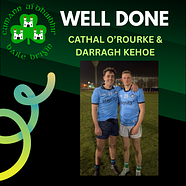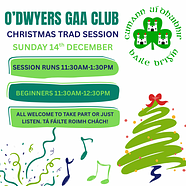With 45.2% of our club members girls/women, we are fully behind this initiative from Anna Geary
#Fun #Friends #Learning #Team #nojudgement #GAA
"I want the girls to understand that physical activity shouldn't be a chore. Sport doesn't have to be this thing that they force themselves to do."
Don't miss Anna Geary: #WhyGirlsQuitSport Tonight 9.30pm RTE 2
Please watch it with the girls 👍 great insights into why girls give up sport but more importantly why they need to continue to be involved in sport. #Fun #Friends #Learning #Team #nojudgement #GAA
Why Girls Quit Sport is on RTÉ 2 at 9.30pm on Thursday, July 15 and July 22.
Whether it's talking about periods, breaking down sexist attitudes or helping them navigate the pressures of social media, we all have a role to play in encouraging teenage girls not to give up on sport and its life-enhancing benefits, Anna Geary tells Marjorie Brennan
Anyone who has seen Anna Geary in action, whether it’s on the pitch playing camogie for Cork, as a coach on the RTÉ show Ireland’s Fittest Family or gliding across the dance floor on Dancing With the Stars, will know how competitive she is. After all, she didn’t bag four All-Ireland titles for her native county by holding back.
However, Geary admits her latest project made her re-evaluate her approach to sport. Why Girls Quit Sport is a two-part documentary for RTÉ in which Geary explores the reasons behind the huge drop-out rate in sports participation in teenage girls. In the documentary, she enlists a cohort of somewhat reluctant girls from Ringsend College, a secondary school in Dublin, in attempts to form a Gaelic football team.
“This documentary was an eye-opener for me, I am probably one of the most competitive people you will ever meet. But the girls made me realise that sport isn’t just about that. If you focus on the winning and losing, you will lose people,” says Geary.
Make training and sport fun first, and the rest will follow, she says. This is highlighted in the documentary by former senior Dublin ladies footballer Cliodhna O’Connor, now an athlete development coach, who says that anyone training and setting up teams at under-age the same way as at adult level is getting it wrong.
“For me, that was one of the most striking and poignant things that came out of the documentary,” says Geary. “She is right. Too many coaches, parents and teachers teach underage teams like adult teams, the training structure, the discipline, the same level of seriousness is expected. That is not what sport is about.
"It is also meant to be about social activity and people feeling a sense of belonging.
One of the biggest things I learned from the documentary is that once there was fun and enjoyment, there was a sense of inclusivity and there was no judgment — they knew if they made a mistake, it wasn’t going to be highlighted and they weren’t going to be humiliated.
"Once it was a safe environment, and they were enjoying themselves and having fun with their friends, then they didn’t mind the competition element, they were striving and becoming their best selves. It was all underpinned by fun.”
As the documentary points out, the statistics on teenage girls’ participation in sport are stark — by the age of 13, 50% of young women drop out of sport, while only 7% of girls aged 14 to 15 meet the daily recommended activity levels.
There are many reasons for this, not least the onset of puberty, their changing bodies and the related issues in terms of self-image. Geary says that we need to get used to talking about these topics and normalising issues such as periods and menstruation.
“I feel that even this year, there seems to be a lot more willingness to talk about menstruation and periods. It is such a taboo subject given that it is one of the most natural things that happens the body. It hasn’t been normalised, people get uncomfortable when it is brought up — that is the case with anything, it was how we were with mental health for years.
"Periods are exactly the same. I have a friend who is a strength and conditioning coach of a women’s team. We were chatting and I said he had to be aware of women’s menstruation cycles, and he was like ‘what do you mean?’ And I told him it was because the elasticity in your body changes when you have your period. There was an inter-county team up North, I think in one season, nine of the girls did their ACLs [anterior cruciate ligaments], all of them around the time of their periods.
"He was like, ‘how would I know about their periods?’ I told him he needed to say it straight out, tell them, ‘if you are on your period, don’t do this drill’. Give them the information, normalise the conversation, it is not a big thing. He did say it and none of them batted an eyelid.”
When it comes to self-consciousness and body awareness, Geary says it is important to accommodate girls’ natural insecurities and make them feel comfortable when playing sport.
“When the girls found out we were going to be doing a team sport, one of the first questions was ‘what are we wearing?’ They didn’t want to be wearing a shorts and jersey, they were embarrassed. It did feed into being uncomfortable and self-conscious about their body. Even sweating, these girls are being led to believe it is dirty, when actually they look their most healthy when they are exerting themselves, and they are focused. If they do feel more comfortable wearing leggings, let them wear leggings. Would you rather they didn’t come back training?
Girls’ preoccupation with how they look, even when playing sport, is also being fed by constant exposure to social media, which is consuming a significant proportion of their time and energy. Geary says its effect cannot be underestimated.
“The influence of social media…it was quite stark. For the girls, it was really apparent that social media plays such a big part in their lives. It was often a thing where they felt it was an either/or — they could either play sport or be on social media because they didn’t have time for both. One girl said to me the only time she was without her phone was when she was charging it and the lead was too short so she couldn’t be on it at the same time.
"We need to acknowledge that we don’t know how to handle social media. It is not as simple as just getting them off their phones — that’s like telling someone who is struggling with their weight to stop eating so much. You have to give people the tools to manage it.”
While Geary’s experience is in camogie, she says that any sport or activity that gets girls moving is valuable — if they don’t like one, it is important that they try another. Many of the girls she met from Ringsend College were interested in dancing, so she worked this into the training sessions.
“If I was a parent and I had an opportunity to have my kids involved in GAA, of course I would love that, but if it turned out that they didn’t enjoy it, I wouldn’t say 'if you are not doing that, you are not doing anything’. Fundamentally it is about activity and movement. A good few of the girls loved dancing and making TikTok videos. So for our warm-up, we would do a dance routine, get them moving. It also sets the tone. There is enjoyment and laughter brings a good vibe to training, and that is why everyone is there at the end of the day.”
Geary also worked to tackle the girls’ pre-conceptions of what being ‘sporty’ looked like.
“A lot of the girls, were like ‘I’m not the sporty type’. I asked them what they thought that looked like. They just saw the discipline, the seriousness, the commitment, the discomfort…that was what they associated with sport. That is all the stuff we have the power to change. We can create an environment where every girl and boy feels they are sporty because sports means being with your friends, running around and feeling good about yourself, learning skills, and having a sense of belonging.
"When people think of sport, a lot of people think of the elite, the inter-county players, the Olympians, and that’s brilliant, but the reality is they represent the 1% of people who play sport in Ireland. The other 99% that we need to focus on, that is where we are losing people.”
Geary also points to the double standards at play, citing the pressure to quit sport because of exams as one example.
“There seemed to be more pressure on girls to give up sport during an exam year. If girls want to give up sport, it is tolerated more than when boys want to give up sport. I thankfully did really well in my leaving cert and I put that down to playing sport until my exams. I had that outlet to run around with friends and switch off. Schools need to make sure more pressure isn’t being put on girls to give up sport.”
As Robyn, one of the girls in the documentary, points out, women’s sport is not taken as seriously as men’s and this also affects participation. Geary says society as a whole has a role to play in promoting women’s sport and making sure it is given parity of esteem with men’s sport.
“Younger people are like sponges and they see it. It starts from the top down, at Government level — we have seen where the funding for women’s sport wasn’t on a par with men’s sport. You can’t be saying ‘you are just as valued’ then you are not given the same money, sponsorship and resources.
"Also at grassroots level, the people involved with teams, the parents, the teachers…if you are a parent, and you have a son and a daughter, ask, are you more invested in your son’s sport? If a girl comes home and has had a bad time at training and says she doesn’t want to play any more, are you more likely to let her give up? Do the boys’ teams have more gear and resources?”
While things are changing, sexist attitudes are often entrenched, she says.
“Traditionally there was a stereotype that fathers and sons bonded over sport, why can’t mothers and daughters, mothers and sons, fathers and daughters bond over sport? These are things that we as individuals can change. Why shouldn’t a woman be training a boy’s team? Just because it has been done that way always doesn’t mean that is the right way to do it.”
She believes the documentary will be an important watch not only for girls and women, but also boys and men.
“It is about educating boys as well — I would love it to be shown to boys in school. Even my husband, who has obviously lived every step of this with me, he said down the line he might be a dad and he was thinking that men also need to ask themselves what is their attitude to women in sport, are they part of the problem?”
Geary says it is fitting that the documentary is now going out during a summer of sport, as the Euros finish and the Olympics start, especially as the pandemic hit after filming began and all sport came to a standstill. With GAA off the cards because of Covid restrictions, the girls instead run a group marathon.
“There was a time there when we weren’t sure whether it would be airing. I stayed in contact with the girls during the lockdown, we were doing online workouts and I was chatting to them. I didn’t want to lose the momentum. When we had to change tack to the marathon, it was a big surprise but after the initial apprehension, they smashed it. Girls that I had to drag around for one lap were suddenly saying ‘I’m going to run this lap with her because she is struggling’.
"They bought into the idea of what a team is meant to be, and that is a support to each other. If they learned nothing else and they took that with them, to me that was a success, that they started thinking about sport differently, not about how good they were.”
In the show, Geary looks at how sport has become even more vital now for teenagers’ mental health, which has been adversely affected by lockdown.
“Their friends are everything at that age. To be taken away from them and the things that allow them to meet up, like sport, was extremely hard. Sport is so much more than a game, it is fundamental to our mental health, to our sense of connection, wellbeing and belonging.”
Ultimately, making the documentary proved to be hugely rewarding for Geary and it is clear that girls’ participation in sport is something she will continue to champion.“The girls are such stars, their personalities are infectious and they are so honest. I’m hoping girls watching can identify with them. I have learned from this that sport is about much more than winning and losing. Not all of these girls care about being the best, they are happy to be there, feel valued and enjoy themselves, and be competitive. It made me re-evaluate what sport should look like for boys and girls.”
Article featured in the Irish Examiner Sat July 10th. Image credit Moya Nolan







